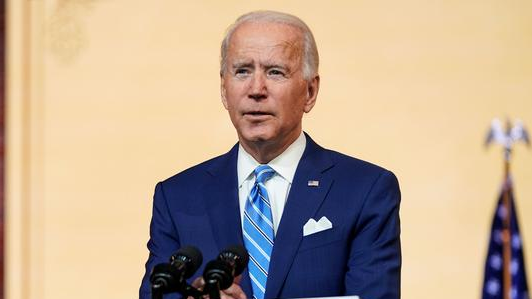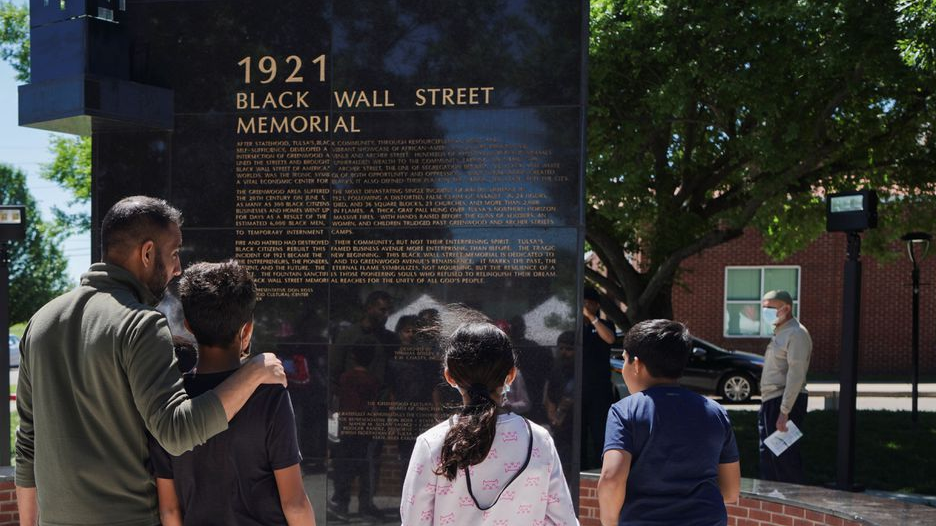
Editor's note: Bradley Blankenship is a Prague-based American journalist, political analyst and freelance reporter. The article reflects the author's opinions and not necessarily the views of CGTN.
United Nations (UN) High Commissioner for Human Rights Michelle Bachelet recently called on countries to do more to help end discrimination, violence and systemic racism against people of African descent in a report launched after the murder of George Floyd in the United States. Notably, the report mentioned reparations as a key instrument in addressing the racism and abuse faced by people of African descent.
"Reparations should not only be equated with financial compensation," she noted, also adding that it should include restitution, rehabilitation, acknowledgement of injustices, apologies, memorialization, educational reforms and "guarantees" that such injustices won't happen again.
Though the report by Bachelet did not necessarily single out the U.S., a significant amount of the report did focus on the U.S. since systemic racism is such a serious issue there – and since it was George Floyd's murder by a white police officer, Derek Chauvin, that began worldwide protests against racial injustice.
The administration of U.S. President Joe Biden, who also served as vice president to the first Black president, Barack Obama, and whose vice president, Kamala Harris, is currently the first Black and Asian woman in that role, has been notably blunt on race relations compared to past administrations. He has apologized for the racial injustice of the past and present unlike any other president, and that is certainly a step in the right direction.
However, as a candidate, Biden supported a commission to examine reparations more thoroughly – but, as president, Biden has set the bar low under any reparations-related legislation due to political constraints.
Biden's concerns come from the U.S. Senate, which is split evenly 50-50 along partisan lines. Because of how the rules of the Senate operate, any legislation on reparations would likely need to garner some votes from Republicans who are unequivocally a party based on white identity politics, namely white victimhood.
Republican voters are often convinced that in order for Black people to receive reparations in some way, it would require white people to lose something. They often describe this as "special treatment" or, in a more extreme bastardization, "reverse racism."
On top of this, a significant amount of Democratic voters are also squeamish about reparations, at least when it comes to the idea of cash reparations. This is reflected by the fact that, according to a recent poll by the University of Massachusetts, Amherst, about two-thirds of Americans oppose cash reparations – and most often because they feel that the sin of slavery (falsely equated with racism) has already been atoned for.

A family reads the Black Wall Street Memorial during festivities of the 100th anniversary of the 1921 Tulsa Massacre in Tulsa, Oklahoma, May 29, 2021. /Reuters
A family reads the Black Wall Street Memorial during festivities of the 100th anniversary of the 1921 Tulsa Massacre in Tulsa, Oklahoma, May 29, 2021. /Reuters
Despite this, I think that the Biden administration could actually achieve some results on this issue through a different framing.
The United States is already such a deeply divided and unequal country, and people of all backgrounds are demanding redistributive policies that could help improve their lives significantly. Still, racial disparities in wealth in the U.S. are so extreme that race is essentially a proxy for class.
It means that any systemic redistributive policy (things like a minimum wage hike, universal higher education, Medicare For All, etc.) would greatly improve the lives of Black Americans while also not leaving behind poor whites. It could serve as a form of reparation without any accompanying racial resentment, and indeed there are many poor communities that are predominantly white that also deserve to benefit from such policies.
At the same time, there are indeed policies that need to be more explicitly geared toward helping Black people prosper since there have been explicit policies in the past that helped whites do the same at the detriment of others. This is not just about slavery, but, for example, also includes recent policies like the racially discriminatory federal home loan programs in the mid-20th century that helped white families become home owners while excluding non-whites.
This policy alone is responsible for much of the wealth disparity seen today in the country given that owning property is one of the primary ways that families build wealth. Because of this, the federal government needs to move beyond just dealing with housing discrimination perpetuated by property owners but actually compensating Black people for discrimination committed by the federal government in the past. This could be in the form of a government-backed home loan program specifically designed for Black people.
In addition to all of this, plus the ongoing conversation on police practices and being honest about American history in terms of the education system, the country generally needs a cultural shift. The administration could help facilitate this exact kind of cultural shift by not just amping up liberal identity politics through symbolic gestures, but by actively pushing forward policies that would materially benefit the lives of Black people while also setting the historical record straight as to why these policies are so important.
(If you want to contribute and have specific expertise, please contact us at opinions@cgtn.com.)

